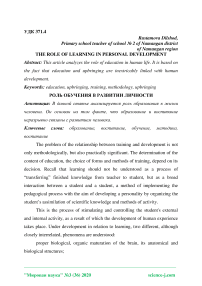The role of learning in personal development
Автор: Rustamova D.
Журнал: Мировая наука @science-j
Рубрика: Основной раздел
Статья в выпуске: 3 (36), 2020 года.
Бесплатный доступ
This article analyzes the role of education in human life. It is based on the fact that education and upbringing are inextricably linked with human development.
Education, upbringing, training, methodology
Короткий адрес: https://sciup.org/140289207
IDR: 140289207 | УДК: 371.4
Текст научной статьи The role of learning in personal development
The problem of the relationship between training and development is not only methodologically, but also practically significant. The determination of the content of education, the choice of forms and methods of training, depend on its decision. Recall that learning should not be understood as a process of “transferring” finished knowledge from teacher to student, but as a broad interaction between a student and a student, a method of implementing the pedagogical process with the aim of developing a personality by organizing the student’s assimilation of scientific knowledge and methods of activity.
This is the process of stimulating and controlling the student's external and internal activity, as a result of which the development of human experience takes place. Under development in relation to learning, two different, although closely interrelated, phenomena are understood:
proper biological, organic maturation of the brain, its anatomical and biological structures;
mental (in particular, mental) development as a certain dynamics of its levels, as a kind of mental maturation.
In psychological and pedagogical science, at least three points of view have developed on the relationship between learning and development. The first and most common is that learning and development are seen as two independent processes. But learning, as it were, is built on brain maturation. Thus, learning is understood as a purely external use of the opportunities that arise in the development process. V. Stern wrote that learning follows development and adapts to it. And since this is so, there is no need to intervene in the process of mental maturation, no need to interfere with it, but patiently and passively wait for the learning opportunities to mature.
Scientists who hold the second point of view merge learning and development, identify both processes (James, Thorndike).The third group of theories combines the first two points of view and supplements them with a new position: learning can go not only after development, not only keep up with it, but also ahead of development, moving it further and causing a neoplasm in it.
This essentially new idea was put forward by L.S. Vygotsky. He substantiated the thesis about the leading role of education in personality development. In this regard, L.S. Vygotsky identified two levels of mental development of the child. The first is the level of actual development as the student’s current level of preparedness, which is characterized by what tasks he can carry out quite independently. The second, higher level, which he called the zone of proximal development, means that the child cannot perform on his own, but with which he copes with a little help. What a child does today with the help of an adult, noted L.S. Vygotsky, tomorrow he will do it on his own; that which was part of the zone of proximal development, in the learning process goes to the level of actual development.
Modern domestic pedagogy stands on the point of view of the dialectical relationship of learning and personality development: outside learning, there can be no full-fledged personality development. Education stimulates, leads development, at the same time relies on it, but does not build up purely mechanically.
Learning as an activity takes place where human actions are guided by a conscious goal to assimilate certain knowledge, skills, and abilities. Teaching is a specifically human activity, and it is possible only at that stage in the development of the human psyche when he is able to regulate his actions with a conscious goal. The doctrine makes demands on cognitive processes (memory, ingenuity, imagination, flexibility of the mind) and volitional qualities (attention management, regulation of feelings, etc.).In educational activity, not only the cognitive functions of activity (perception, attention, memory, thinking, imagination) are combined, but also needs, motives, emotions, will.
Список литературы The role of learning in personal development
- Mamajonova, G. K. (2019). The role of bioethics in fostering the family's spiritual foundations. International Journal of Advanced Science and Technology, 28(12), 397-401.
- Mamazhonova, Gulnoz Karimovna (2019) "ROLE OF BIOETHICS IN THE DEVELOPMENT OF MEDICINE AS A CULTURAL FORM", Scientific Bulletin of Namangan State University: Vol. 1:Iss. 7, Article 27.
- Shermuhamedova, N. A. (2005). Stil nauchnogo myishleniya. Tashkent, Universitet.
- Shermuhamedova, N. (2008, January). Научный поиск как творческий процесс. In Proceedings of the XXII World Congress of Philosophy (Vol. 53, pp. 367-375).
- Шермухамедова, Н. А. (2002). Некоторые суждения Абу-Насра аль-Фараби о соотношении логики и грамматики. Credonew, (2), 10-10.


